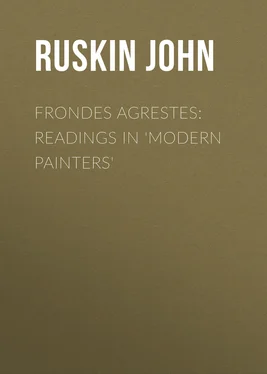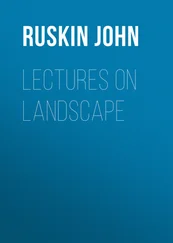John Ruskin - Frondes Agrestes - Readings in 'Modern Painters'
Здесь есть возможность читать онлайн «John Ruskin - Frondes Agrestes - Readings in 'Modern Painters'» — ознакомительный отрывок электронной книги совершенно бесплатно, а после прочтения отрывка купить полную версию. В некоторых случаях можно слушать аудио, скачать через торрент в формате fb2 и присутствует краткое содержание. Издательство: Иностранный паблик, Жанр: foreign_antique, foreign_home, literature_19, visual_arts, на английском языке. Описание произведения, (предисловие) а так же отзывы посетителей доступны на портале библиотеки ЛибКат.
- Название:Frondes Agrestes: Readings in 'Modern Painters'
- Автор:
- Издательство:Иностранный паблик
- Жанр:
- Год:неизвестен
- ISBN:нет данных
- Рейтинг книги:5 / 5. Голосов: 1
-
Избранное:Добавить в избранное
- Отзывы:
-
Ваша оценка:
- 100
- 1
- 2
- 3
- 4
- 5
Frondes Agrestes: Readings in 'Modern Painters': краткое содержание, описание и аннотация
Предлагаем к чтению аннотацию, описание, краткое содержание или предисловие (зависит от того, что написал сам автор книги «Frondes Agrestes: Readings in 'Modern Painters'»). Если вы не нашли необходимую информацию о книге — напишите в комментариях, мы постараемся отыскать её.
Frondes Agrestes: Readings in 'Modern Painters' — читать онлайн ознакомительный отрывок
Ниже представлен текст книги, разбитый по страницам. Система сохранения места последней прочитанной страницы, позволяет с удобством читать онлайн бесплатно книгу «Frondes Agrestes: Readings in 'Modern Painters'», без необходимости каждый раз заново искать на чём Вы остановились. Поставьте закладку, и сможете в любой момент перейти на страницу, на которой закончили чтение.
Интервал:
Закладка:
7. He who habituates himself in his daily life to seek for the stern facts in whatever he hears or sees, will have these facts again brought before him by the involuntary imaginative power, in their noblest associations; and he who seeks for frivolities and fallacies, will have frivolities and fallacies again presented to him in his dreams. 4 4 Very good. Few people have any idea how much more important the government of the mind is, than the force of its exertion. Nearly all the world flog their horses, without ever looking where they are going.
8 . All the histories of the Bible are yet waiting to be painted. Moses has never been painted; Elijah never; David never (except as a mere ruddy stripling); Deborah never; Gideon never; Isaiah never. 5 5 I knew nothing, when I wrote this passage, of Luini, Filippo Lippi, or Sandro Botticelli; and had not capacity to enter into the deeper feelings, even of the men whom I was chiefly studying,—Tintoret and Fra Angelico. But the British public is at present as little acquainted with the greater Florentines as I was then, and the passage, for them , remains true.
What single example does the reader remember of painting which suggested so much as the faintest shadow of their deeds? Strong men in armour, or aged men with flowing beards, he may remember, who, when he looked at his Louvre or Uffizi catalogue, he found were intended to stand for David, or Moses. But does he suppose that, if these pictures had suggested to him the feeblest image of the presence of such men, he would have passed on, as he assuredly did, to the next picture, representing, doubtless, Diana and Actæon, or Cupid and the Graces, or a gambling quarrel in a pothouse—with no sense of pain or surprise? Let him meditate over the matter, and he will find ultimately that what I say is true, and that religious art at once complete and sincere never yet has existed.
SECTION II.
POWER AND OFFICE OF IMAGINATION
9. What are the legitimate uses of the imagination,—that is to say, of the power of perceiving, or conceiving with the mind, things which cannot be perceived by the senses? Its first and noblest use is, 6 6 I should be glad if the reader who is interested in the question here raised, would read, as illustrative of the subsequent statement, the account of Tintoret's 'Paradise,' in the close of my Oxford lecture on Michael Angelo and Tintoret, which I have printed separately to make it generally accessible.
to enable us to bring sensibly to our sight the things which are recorded as belonging to our future state, or invisibly surrounding us in this. It is given us, that we may imagine the cloud of witnesses, in heaven, and earth, and sea, as if they were now present,—the souls of the righteous waiting for us; that we may conceive the great army of the inhabitants of heaven, and discover among them those whom we most desire to be with for ever; that we may be able to vision forth the ministry of angels beside us, and see the chariots of fire on the mountains that gird us round; but, above all, to call up the scenes and facts in which we are commanded to believe, and be present, as if in the body, at every recorded event of the history of the Redeemer. Its second and ordinary use is, to empower us to traverse the scenes of all other history, and to force the facts to become again visible, so as to make upon us the same impression which they would have made if we had witnessed them; and, in the minor necessities of life, to enable us, out of any present good, to gather the utmost measure of enjoyment, by investing it with happy associations, and, in any present evil, to lighten it, by summoning back the images of other hours; and also to give to all mental truths some visible type, in allegory, simile, or personification, which shall most deeply enforce them; and finally, when the mind is utterly outwearied, to refresh it with such innocent play as shall be most in harmony with the suggestive voices of natural things, permitting it to possess living companionship, instead of silent beauty, and create for itself fairies in the grass, and naiads in the wave.
10. Yet, because we thus reverence the power and art of imagination, let none of us despise the power and art of memory.
Let the reader consider seriously what he would give at any moment to have the power of arresting the fairest scenes, those which so often rise before him only to vanish; to stay the cloud in its fading, the leaf in its trembling, and the shadows in their changing; to bid the fitful foam be fixed upon the river, and the ripples be everlasting upon the lake; and then to bear away with him no darkness or feeble sun-stain, (though even that is beautiful,) but a counterfeit which should seem no counterfeit—the true and perfect image of life indeed. Or rather, (for the full majesty of such a power is not thus sufficiently expressed,) let him consider that it would be in effect nothing less than a capacity of transporting himself at any moment into any scene—a gift as great as can be possessed by a disembodied spirit; and suppose, also, this necromancy embracing not only the present but the past, and enabling us seemingly to enter into the very bodily presence of men long since gathered to the dust; to behold them in act as they lived; but, with greater privilege than ever was granted to the companions of those transient acts of life, to see them fastened at our will in the gesture and expression of an instant, and stayed on the eve of some great deed, in immortality of burning purpose.—Conceive, so far as is possible, such power as this, and then say whether the art which conferred it is to be spoken lightly of, or whether we should not rather reverence, as half-divine, a gift which would go so far as to raise us into the rank, and invest us with the felicities, of angels. 7 7 Passage written in opposition to the vulgar notion that the 'mere imitation' of Nature is easy, and useless.
11 . I believe the first test of a truly great man is his humility. I do not mean by humility, doubt of his own power, or hesitation of speaking his opinions; but a right understanding of the relation between what he can do and say, and the rest of the world's sayings and doings. All great men not only know their business, but usually know that they know it; and are not only right in their main opinions, but they usually know that they are right in them; only they do not think much of themselves on that account. Arnolfo knows he can build a good dome at Florence; Albert Durer writes calmly to one who has found fault with his work,—"It cannot be better done;" Sir Isaac Newton knows that he has worked out a problem or two that would have puzzled anybody else; only they do not expect their fellow-men, therefore, to fall down and worship them. They have a curious under-sense of powerlessness, feeling that the greatness is not in them, but through them—that they could not do or be anything else than God made them; and they see something divine and God-made in every other man they meet, and are endlessly, foolishly, incredibly merciful.
Читать дальшеИнтервал:
Закладка:
Похожие книги на «Frondes Agrestes: Readings in 'Modern Painters'»
Представляем Вашему вниманию похожие книги на «Frondes Agrestes: Readings in 'Modern Painters'» списком для выбора. Мы отобрали схожую по названию и смыслу литературу в надежде предоставить читателям больше вариантов отыскать новые, интересные, ещё непрочитанные произведения.
Обсуждение, отзывы о книге «Frondes Agrestes: Readings in 'Modern Painters'» и просто собственные мнения читателей. Оставьте ваши комментарии, напишите, что Вы думаете о произведении, его смысле или главных героях. Укажите что конкретно понравилось, а что нет, и почему Вы так считаете.



![John Ruskin - Stones of Venice [introductions]](/books/732383/john-ruskin-stones-of-venice-introductions-thumb.webp)








